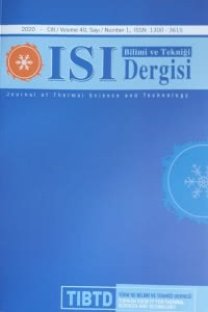The usage of hydrogen for improving emissions and fuel consumption in a small gasoline engine
Düşük güçlü benzinli motorda emisyonları ve yakıt tüketimini iyileştirmek için hidrojen kullanımı
___
- Al-Baghdadi, M.A.R.S. 2004. Effect of compression ratio, equivalence ratio and engine speed on the performance and emission characteristics of a spark ignition engine using hydrogen as a fuel. Renewable Energy 29: 2245-2260.
- Bartolini, C. M., Caresana, F., and Pelagalli, L., Experimental results from a two-stroke gasoline directinjected, American Society of Mechanical Engineers, Internal Combustion Engine Division, (Publication) 40: 53-58, 2003.
- Celik, M. B., Performance improvement and emission reduction in small engine with low efficiency, Journal of the Energy Institute 80: 3, 175–180, 2007.
- Das, L. M., Gulati, R., and Gupta, P.K., A comparative evaluation of the performance characteristics of a spark ignition engine using hydrogen and compressed natural gas as alternative fuels, Int J Hydrogen Energy 25: 783-793, 2000.
- Desoky, A. A., and Rabie, L. H.., Comparative performance study of spark ignition engines burning alcohols, gasoline and alcohol-gasoline blends, 6 th Miami International Conference on Alternative Energy Source, Proceedings of Condensed Papers, p.331, 12-14 Dec., Miami Beach, FL, USA, 1983.
- El-Emam, S. H., and Desoky, A. A., A study on the combustion of alternative fuels in spark-ignition engines, Int J Hydrogen Energy 10:7-8, 497-504, 1985.
- Huang, Z., Wang, J., Liu, B., Zeng, K., Yu, J., and Jiang, D., Combustion characteristics of a direct-injection engine fueled with natural gas–hydrogen blends under different ignition timings, Fuel 86: 381–387, 2007.
- Jing-ding, L., Ying-qing, L., and Tian-shen, D., Improvement on the combustion of a hydrogen fueled engine, Int J Hydrogen Energy 11:10, 661-668, 1986.
- Kahraman, E., Ozcanli, S. C., and Ozerdem, B., An experimental study on performance and emission characteristics of a hydrogen fuelled spark ignition engine, Int J Hydrogen Energy 32:12, 2066-2072, 2007.
- Karim, G. A., Hydrogen as a spark ignition engine fuel, Int J Hydrogen Energy, 28: 569–577, 2003.
- Akansu, S. O., Dulger, Z., Kahraman, N., and Veziroğlu, T. N., Internal Combustion Engines Fueled by Natural Gas - Hydrogen Mixtures, Int.J. of Hydrogen Energy, Volume 29, Issue 14, Pages 1527-1539, 2004.
- Kosar, M., Effects of using hydrogen in gasoline engines on performance and emissions, Master thesis, Zonguldak Karaelmas University, Graduate School of Natural and Applied Sciences, 67 pages, Zonguldak, Turkey, 2007.
- Lee S. H., Howlett, R. J., and Walters, S. D., Proc. 7th Int. Conf. on Knowledge Based Intelligent Information and Engineering Systems, September, KES, Vol. 1, 722–732, Oxford, UK, 2003.
- Li, H. and G. A. Karim, Exhaust emissions from an SI engine operating on gaseous fuel mixtures containing hydrogen, Int J Hydrogen Energy 30: 1491 – 1499, 2005.
- Li, H. and G. A. Karim, Knock in spark ignition hydrogen engines, Int J Hydrogen Energy 29: 859-865, 2004.
- Mathur, H.B. and Khajuria, P.R., Performance and emission characteristics of hydrogen fueled spark ignition engine, Int J Hydrogen Energy 9: 8, 729-735, 1984.
- Mohammadi, A., Shioji, M., Nakai, Y., Ishikura, W., and Tabo, E., Performance and combustion characteristics of a direct injection SI hydrogen engine, Int J Hydrogen Energy 32: 296-304, 2007.
- Murillo, S., Miguez, J.L., Porteiro, J., Hernandez, J.J., and Lopez-Gonzalez, L. M., Viability of LPG use in low-power outboard engines for reduction in consumption and pollutant emissions, International Journal of Energy Research 27: 5, 467-480,2003.
- Nagalingam, B., Dübel, M., and Schmillen, K., Performance of the supercharged spark ignition hydrogen engine. SAE paper, No: 831688, 1983.
- Poola, R. B., Nagalingam, B., and Gopalakrishnan, K. V. , Performance studies with biomass-derived high-octane fuel additives in a two-stroke spark-ignition engine, Biomass and Bioenergy 6: 5, 369-379, 1994.
- Sierens, R. and Verhelst, S., A hydrogen fuelled V-8 engine for ity-bus applicaton, Int J Automotive Technoogy 2: 39-45, 2001.
- Subramanian, V., Mallikarjuna, J. M., and Ramesh, A., Effect of water injection and spark timing on the nitric oxide emission and combustion parameters of a hydrogen fuelled spark ignition engine, Int J Hydrogen Energy 32:1159-1173, 2007.
- Varde, K. S., Combustion characteristics of small spark ignition engines using hydrogen supplemented fuel mixtures, SAE Preprints, n 810921, 7 p, 1981.
- Yi, H. S., Min, K., and Kim, E. S., The optimised mixtue formation for hydrogen fuelled engines, Int J Hydrogen Energy 25: 685-690, 2000.
- Zhenzhong, Y., Jianqin, W., Zhuoyi, F., and Jinding, L., An investigation of optimum control of ignition timing and injection system in an in-cylinder injection type hydrogen fueled engine, Int J Hydrogen Energy 27: 213–217, 2002.
- Zhiyuan, S., Qing, W., and Tiecheng, B., An investigation into application of ceramic-metal FGM plating to small high speed gasoline engine Materials Science Forum 423-425: 797-801, 2003.
- ISSN: 1300-3615
- Yayın Aralığı: Yılda 2 Sayı
- Başlangıç: 1977
- Yayıncı: TÜRK ISI BİLİMİ VE TEKNİĞİ DERNEĞİ
İzmir İline Ashrae Açık Gün Modelinin Uygulanabilirliğinin İrdelenmesi
The usage of hydrogen for improving emissions and fuel consumption in a small gasoline engine
Bulent OZDALYAN, M. Bahattin CELIK, Murat KOSAR
Rüzgar Türbinleri İçin Düşük Hücum Açılarında Farklı Kanat Profillerinin Performans Analizi
Mikroborularda Tek Fazlı Laminer Su Akışında Viskoz Isınma Etkisinin Deneysel Olarak Belirlenmesi
Nezaket PARLAK, Mesut GÜR, Tahsin ENGİN, Hasan KÜÇÜK
Second law and sensitivity analysis of a combined cycle power plant in Turkey
Mustafa Zeki YILMAZOĞLU, Ehsan AMIRABEDIN
Investigation of applicability of ASHRAE clear-sky model to Izmir, Turkey
Tünel Fırın Ön Isıtma Bölgesinin Matematiksel Modeli ve Simülasyonu
Ebru MANÇUHAN, Kurtul KÜÇÜKADA, Emre ALPMAN
Mathematical modeling and simulation of the preheating zone of a tunnel kiln
Kurtul KÜÇÜKADA, Ebru MANÇUHAN, Emre ALPMAN
The effect of different indoor air velocities and temperatures on thermal comfort
Nurullah ARSLANOĞLU, Abdulvahap YİĞİT
Su’yun Soğutucu Akışkan Olarak Aşırı Isıtma Etkisinin Diğer Akışkanlarla Kıyaslanması
